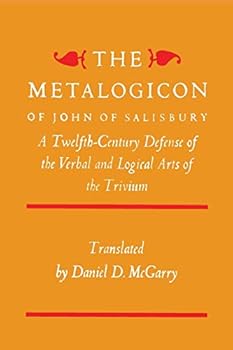The Metalogicon of John of Salisbury: A Twelfth-Century Defense of the Verbal and Logical Arts of the Trivium
Select Format
Select Condition 
Book Overview
2015 Reprint of 1962 Edition. Full facsimile of the original edition. Not reproduced with Optical Recognition Software. "The Metalogicon", completed in 1159, is recognized as a milestone in the history of educational theory. Undertaken to defend the thorough study of the Trivium against attack at the hands of those who wished less attention accorded to grammar, logic, and rhetoric, it is a treasure of information about twelfth-century pedagogy as well as an enduring classic in its own right. John of Salisbury, a leading medieval scholar, summarizes the essential lineaments of existing twelfth-century education and affords glimpses of contemporaries such as Peter Abelard, Gilbert de la Porree, and Theirry of Chartres. The present translation is the first to appear in any modern language.
Format:Paperback
Language:English
ISBN:1614277818
ISBN13:9781614277811
Release Date:February 2015
Publisher:Martino Fine Books
Length:336 Pages
Weight:1.36 lbs.
Dimensions:0.8" x 6.1" x 9.2"
Customer Reviews
1 rating
One of the truly great books of philosophy and literature
Published by Thriftbooks.com User , 26 years ago
John of Salisbury (c.1120-1180) was from Wiltshire in deep Wessex, England. He studied under Abelard and was a friend of Saint Bernard of Clairvaux. After getting on the wrong side of the Monarchy in England, for which his employer Thomas A Becket was murdered, he became bishop of Chartres the most beautiful cathedral in the world (even now). The Metalogicon describes the whys and wherefores of medieval logic. It makes a boring subject interesting and attractive. It's tone is light, balanced and sensible in an area of thought which is seldom ever that. It is the best introduction to the subject of medieval logic, better than modern attempts at the same thing, which notoriously suffer from being too clever with respect to the past. You don't have to read from beginning to end, you can dip in to the bits that address your questions. See pp.82-4 on the role and status of logic with respect to thinking in general. The authority is rare and still surpasses modern statements on the subject. Check out pp.166-7 on authoritative texts and the relation of past thought to present. No-one has said it better. Check out pp.111-13 on being too clever - still true you academics! His warning to teachers, pp.117-18. His accounts of Aristotle's Categories and Topics, and his introductions Porpyry and Boethius are superlative. An absolute must for anyone teaching or learning about Medieval thought.





